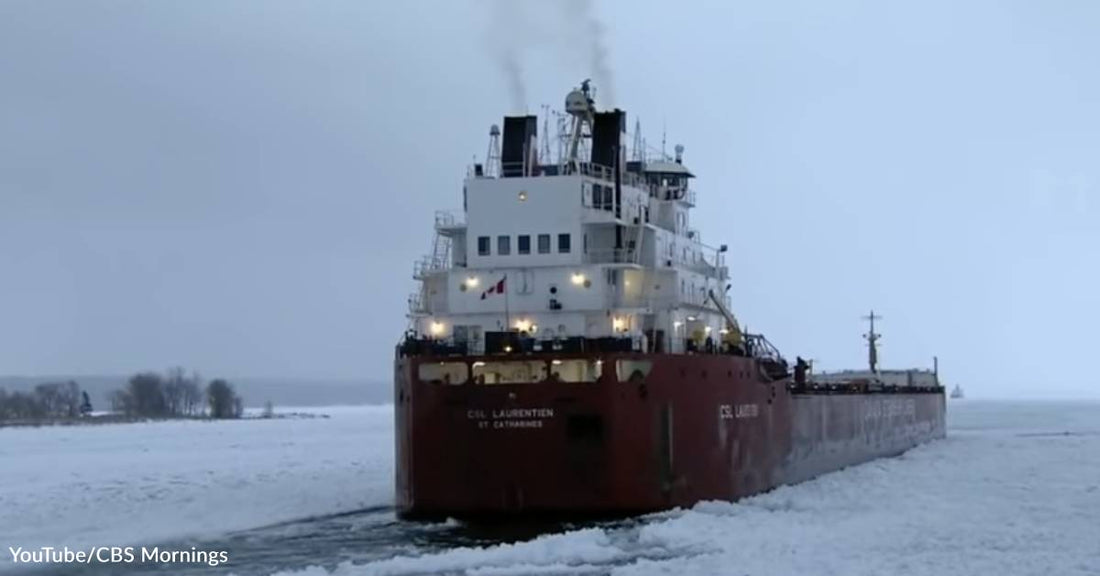USCG Icebreakers Keeping The Great Lakes Open
Dan Doyle
The United States Coast Guard is well known by those who live along the shores of the Great Lakes, and for good reasons. They are instrumental in keeping the waters of those inland, sea-sized lakes safe for both private boaters and for commercial interests. But it is during the winter that they really make a profoundly important difference.
The Great Lakes are so large, it is said that they hold some 20% of the world's freshwater supplies. They really are like seas or oceans in both size and in some cases even depth. But because they are freshwater, they freeze over much more readily than salt water, and this creates a major problem and a greater need for the skills and sea-going equipment the Coast Guard brings to the fore during the winter months.
 Photo: YouTube/CBS Mornings
Photo: YouTube/CBS MorningsOne of the things the Coast Guard does every winter is their Christmas tree delivery to Chicago. They bring those trees to the Windy City to be distributed to people who might not be able to afford such simple Christmas accoutrements. It is one of the joyful community services that the Coast Guard is able to bring to the people they serve along the Great Lakes.
But the greatest service that the Coast Guard brings to the towns, cities, and citizens along the Great Lakes shores is their ability to keep the waters of those lakes open during the winters for the commercial freighters and iron ore ships that are a vital part in bringing needed goods to the cities and industries along those shores.
 Photo: YouTube/CBS Mornings
Photo: YouTube/CBS MorningsThis video will give you a good sense of how important their job is and how they do it. The sub-zero temperatures and winter weather came earlier than usual to the upper midwest and the Great Lakes regions this year. The water on those lakes freezes fast and thick, and, in order to keep the vital shipping lanes open, the United States Coast Guard has 9 Icebreakers that are called upon all winter long to break up that ice enough to enable the huge iron ore and other commercial freighter ships to deliver iron ore to the steel mill smelters and commercial goods to the cities, as well as to transport products out of and around the Great Lakes.
These icebreakers, like the USCG Icebreaker Mackinaw, are 3,500 tons of weight, muscle, and determination. They break up the ice in two ways - by their weight and by manipulating their propulsion systems that churn up the ice like a blender, thus making it possible for the huge commercial ships to get through the ice to their destinations.
 Photo: YouTube/CBS Mornings
Photo: YouTube/CBS MorningsYou will get an idea of how tough this work is in this video as well. One day this year, the temps were down around -18 degrees. One of the jobs on the icebreaker is to have a spotter out on the deck during these maneuvers, to avoid too-close contact with the big ships, etc. Because of the negative temps, the Coasties who do this spotting are only allowed to stay out there for 10 minutes at a time. Any longer, and any exposed skin begins to get frostbitten.
One of the more interesting things you'll hear is that when they are doing their icebreaking, the icebreakers are filled with the noise of breaking up the ice, and they rattle and roll so much that, as one Coastie put it, "It's like living in an earthquake for 18 hours a day."
 Photo: YouTube/CBS Mornings
Photo: YouTube/CBS MorningsThe ice and the weather conditions have been unusually difficult this year already. On one occasion, it took the USCG Icebreaker Mackinaw 17 hours to free one of the big ships from the ice. It is slow going in normal years, but even a bit more so this year apparently.
These 9 USCG Icebreakers will be conducting this very important service on all of the Great Lakes, and they will be doing this important work probably up to April of next year.
This is just one of the many services the United States Coast Guard brings to the nation. We can be very proud of the Coast Guard men and women who make this branch of our military services the best Coast Guard in the world. Once again the men and women of the Coast Guard prove their motto, "Semper Paratus!" Always Prepared. Bravo Zulu, Coasties!
https://www.youtube.com/watch?v=ZTd-sHL1TNU&feature=youtu.be


